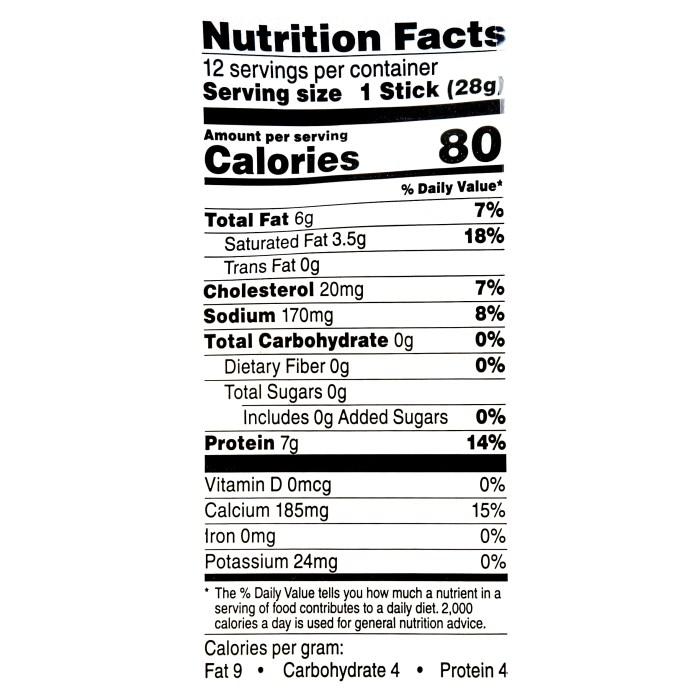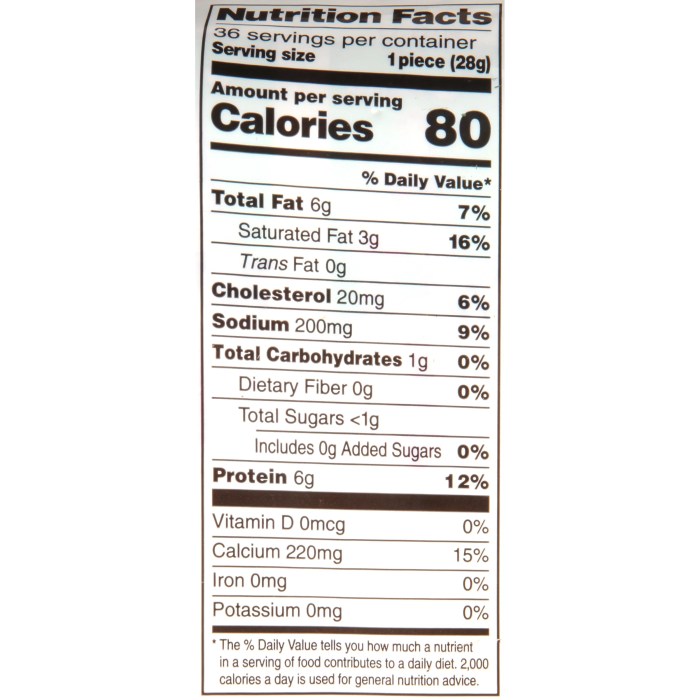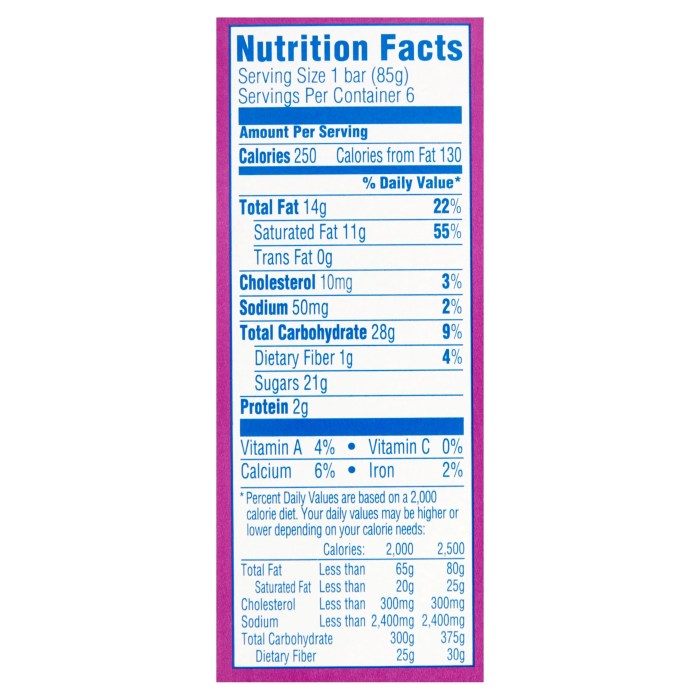String Cheese in a Balanced Diet

Nutrition facts string cheese – String cheese offers a convenient and surprisingly nutritious way to incorporate protein and calcium into a balanced diet. Its portability makes it an ideal snack for busy individuals or a quick addition to a meal, contributing to a healthier lifestyle without sacrificing convenience. Understanding its role within a broader nutritional plan can help you maximize its benefits and create a well-rounded approach to healthy eating.String cheese provides a good source of protein, essential for building and repairing tissues, and calcium, crucial for strong bones and teeth.
These nutrients are vital components of a healthy diet, contributing to energy levels, muscle function, and overall well-being. Incorporating string cheese strategically can support your body’s needs and help you achieve your health goals.
String cheese offers a convenient, portable protein source, but its nutritional value varies by brand. If you’re looking for pizza-related nutrition info, checking out the details on little caesars nutrition facts thin crust might be helpful for comparison. Then you can better assess how string cheese fits into your overall diet plan alongside other choices.
Nutritional Comparison of String Cheese with Other Portable Protein Sources
Choosing the right portable protein source depends on individual dietary needs and preferences. Let’s compare string cheese with other popular options to highlight its unique benefits.
- String Cheese vs. Nuts: While nuts offer healthy fats and fiber in addition to protein, string cheese provides a higher concentration of calcium and is often lower in fat, making it a better choice for those watching their fat intake or needing a calcium boost.
- String Cheese vs. Yogurt: Both are excellent sources of protein and calcium. However, yogurt often contains added sugars, while string cheese is generally lower in sugar. The choice depends on individual preferences and dietary restrictions regarding sugar content.
- String Cheese vs. Hard-boiled Eggs: Both are high in protein, but hard-boiled eggs offer a wider range of essential nutrients, including choline and various vitamins. String cheese, on the other hand, provides a significant amount of calcium, making it a better choice for individuals needing to increase their calcium intake.
Sample Meal Plan Incorporating String Cheese
This sample meal plan demonstrates how easily string cheese can be integrated into a healthy and balanced diet.
Breakfast: Oatmeal with berries and a sprinkle of nuts. This provides complex carbohydrates for sustained energy, antioxidants from berries, and healthy fats from nuts.
Lunch: Salad with grilled chicken or fish, mixed greens, and a light vinaigrette. This offers lean protein, vitamins, and minerals from the vegetables, and healthy fats from the vinaigrette.
Snack: A serving of string cheese. This provides a convenient source of protein and calcium, preventing mid-afternoon energy dips.
Dinner: Baked salmon with roasted vegetables (broccoli, carrots, sweet potatoes). This offers omega-3 fatty acids from the salmon, and various vitamins and minerals from the vegetables.
Nutritional Benefits of the Meal Plan: This meal plan provides a balanced intake of protein, carbohydrates, healthy fats, vitamins, and minerals. The inclusion of string cheese as a snack ensures adequate protein and calcium intake throughout the day, contributing to sustained energy, strong bones, and overall well-being. The meal plan is designed to be versatile and adaptable to individual dietary needs and preferences.
Health Implications and Considerations

String cheese, a convenient and appealing snack, offers a blend of nutritional benefits and potential drawbacks. Understanding these aspects empowers you to make informed choices and incorporate string cheese into your diet mindfully, maximizing its advantages while minimizing any potential risks. Let’s explore the health implications of this popular dairy product.String cheese provides a good source of calcium and protein, both crucial for strong bones and muscle development.
However, it’s also important to be aware of its fat and sodium content, which can impact overall health if consumed excessively. Potential allergic reactions to dairy proteins are another factor to consider.
Sodium Content and Blood Pressure
High sodium intake is linked to increased blood pressure, a major risk factor for heart disease and stroke. Many string cheese varieties contain a significant amount of sodium. Choosing lower-sodium options or limiting portion sizes can help manage sodium intake effectively. For instance, comparing the nutritional labels of different brands reveals considerable variation in sodium content; some brands offer significantly lower sodium versions compared to others.
Regularly checking these labels allows for conscious selection.
Saturated Fat and Cholesterol
Full-fat string cheese contains saturated fat, which can raise LDL (“bad”) cholesterol levels. Elevated LDL cholesterol increases the risk of cardiovascular disease. Low-fat or reduced-fat string cheese options offer a lower saturated fat content, potentially mitigating this risk. A balanced approach, incorporating low-fat string cheese as part of a diet rich in fruits, vegetables, and whole grains, can help maintain healthy cholesterol levels.
For example, a diet incorporating low-fat string cheese alongside regular exercise has been shown to be more beneficial to cholesterol levels than a diet lacking in physical activity, even if it contains higher saturated fat content.
Dairy Allergies and Intolerances
Lactose intolerance, an inability to digest lactose (a sugar in milk), and dairy allergies, immune responses to milk proteins, affect a significant portion of the population. Individuals with these conditions should carefully consider string cheese consumption. Symptoms can range from mild digestive discomfort to severe allergic reactions. Reading ingredient labels carefully and choosing lactose-free alternatives when necessary are crucial for those with these sensitivities.
Consulting with a healthcare professional or registered dietitian is recommended for personalized guidance.
Choosing String Cheese Wisely, Nutrition facts string cheese
Making informed choices about string cheese involves carefully examining nutritional labels and ingredient lists. Prioritize brands with lower sodium and saturated fat content. Pay attention to portion sizes, as even healthier options can contribute to excessive calorie or sodium intake if consumed in large quantities. Reading labels allows you to compare various brands and make choices that best align with your individual dietary goals and health needs.
For example, opting for a string cheese with added vitamins or probiotics can offer additional nutritional benefits.
FAQ Explained: Nutrition Facts String Cheese
Is string cheese good for weight loss?
It can be! Choose low-fat options and watch your portion size. It’s a good source of protein, which can help you feel full.
Does string cheese have a lot of sodium?
Yes, some brands are higher in sodium than others. Check the nutrition label and opt for lower-sodium varieties.
Is string cheese okay for kids?
Generally, yes, but moderation is key. It’s a good source of calcium and protein, but too much can be high in fat and sodium.
What about lactose intolerance?
Look for lactose-free options; many brands now offer them!


0